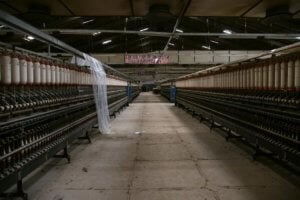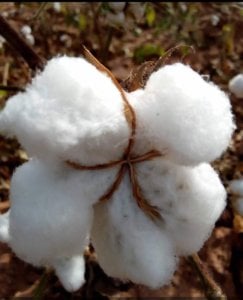Nigeria’s textile industry was once a thriving part of the nation’s economy. The industry was once the country’s second-leading employer, with mills spread throughout various states supported by local cotton farmers. But the industry today is shambles, resulting from a variety of factors, including internal strife, an influx of cheap Chinese fabrics and pests that plague cotton growers. At its peak, just two decades ago, the industry employed 600,000 workers. Today that number is closer to 20,000.
There are no easy ways to fix complex problems. But farmers in Nigeria are hoping the recent approval of two GMO cotton seeds will fuel a resurgence in the troubled sector.

‘White Gold’
Our basic understanding of life, matter and energy has improved significantly in the past decades, due to the tremendous advances made in science. As a result, today we experience intensive technological changes and advancements, stimulating a new era of development in many parts of the world. One the technological advancements we have today is biotechnology, which can be defined as any technological application that involves the use of a whole biological system or parts of living organisms to produce useful products for medical, agricultural or industrial use.

Agricultural biotechnology through a fusion of biochemistry, microbiology, genetic engineering and gene editing, allows the production of crops resistant to a range of stressors, including pests and insects, diseases and environmental challenges such as drought and soil salinity. Nations such as the USA, China, India, Brazil, Argentina, Mexico, Ethiopia, Burkina Faso and South Africa have adopted science and technological innovations to boost agricultural production and drive economic growth. However, in Nigeria lack of government commitment and the “recalcitrant status quo” has long slowed the pace in the adoption of biotechnology.
Cotton is a major cash crop, nicknamed “white gold” by farmers because of financial and economic benefits. The major cotton producing states in Nigeria are Zamfara, Kano, Kaduna, Katsina, Sokoto, Kebbi, Ogun, Ondo and Oyo. Cotton is uniquely versatile with a large and diverse agricultural value chain that creates many jobs and financial opportunities, particularly in the textile industry. However, the textile industry in Nigeria is seemingly dead due to a decline in cotton production. This has led to the closure of cotton mills and other businesses that support the textile industry, which has been ravaged by a range of problems, including pests and insects attacks.
Pests such as aphids, jassids and thrips attack cotton plants and suck their sap. Bollworms from the Lepidopteran species attack cotton plants at different growth stages, causing considerable yield damage of about 60 percent if nothing is done to mitigate them in time.
BT Cotton
Recently, Bt Cotton became the first genetically engineered crop to be adopted in Nigeria. Two Bt Cotton varieties MRC7377 BG ll and MRC7361 BG ll were released and officially registered by the National Committee on Naming, Registration and Release of Crop Materials at its 26th meeting in Ibadan. This is a landmark in the history of Nigerian modern biotechnology. The newly released Bt Cotton varities have the potential to revamp the comatose textile industry by boosting cotton production in Nigeria. Some of the potential benefits of Bt Cotton to Nigerian farmers include:
- The use of Bt cotton will lead to a significant reduction in the use of pesticides/agrochemicals by farmers, reducing the cost of cultivation and hazards on human, animal health and environment during application.
- Farmers will only plant the Bt cotton seedlings and the resulting plant will have the capacity to grow in areas that are infested by bollworms.
- Bt cotton will improve profit for farmers. Taking into considerations the cost of purchasing cotton seedlings, pesticides/agro-chemicals, and the average cost of cotton production on 1 hectare of land, the new seeds are expected to increase yields by 37 percent and improve profit by 50 percent.
‘Armed’ to resist
Bacillus Thuringiensis (Bt) is a soil microbe that produces “Cry proteins” which are toxic to many insect species. Through biotechnology methods, the “insect resistant traits” of Bt have been transferred into cotton to produce a transgenic cotton plant with a built-in defense mechanism to protect itself from lepidopteran bollworms. When the insect feeds on the plant it will ingest some of the plant tissues containing the protoxins which become active in the alkaline (ph=9.6-12.5) mid gut of the insect via enzymatic proteolysis. The toxin molecules bind to specific receptors on the gut membrane, rupturing the insect gut membrane. The sequence of events leads to paralysis of the insect larvae and eventually death within one or two days.
Biosafety concerns
In countries that cultivate Bt cotton and GE crops, No adverse, toxic or any allergic effects of Bt cotton on human or animal health have been reported.
The Bt Cry proteins require certain specific conditions to be activated. For example it has to be ingested into the gut of the organism. When ingested in the gut of humans, the Bt Cry proteins cannot be activated because the human gut is acidic and lacks the specific receptors for the Bt toxins to bind and initiate the structural and physiological changes that lead to death in insects.
The release of Bt cotton in Nigeria is such good news. The new cotton varieties have the potential to raise thousands of farmers from extreme poverty, particularly in northern Nigeria where poverty is endemic. The northern states have the largest share in cotton production in Nigeria. However, research should be intensified to complete the unfinished business of the transgenic Bt cotton. For example, the Bt cotton is not resistant to sucking pests and environmental factors like drought.


